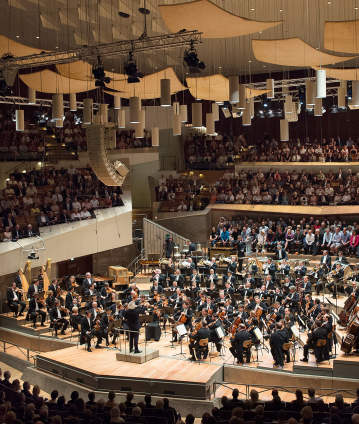Season opening 2016: Simon Rattle conducts Mahler’s Seventh Symphony

The press described this evening with Simon Rattle conducting Mahler’s Seventh Symphony as a “spectacular concert that started the 2016/17 season with a bang”. According to the composer, the work has a “predominantly cheerful character”, but this optimism always remains fragile, ambiguous, on the edge of the abyss. The concert opened with Pierre Boulez’s Éclat – a concentrated work of tonally sensual sophistication.
Since Sir Simon Rattle assumed the position of chief conductor, no other composer has been played on the season opening concerts as often as Gustav Mahler. Mahler’s works have not only been close to Rattle’s heart since the beginning of his career, but also paved the way for him to the Berliner Philharmoniker. In 1987, he gave his debut with the orchestra with the Sixth Symphony; his grandiose interpretation of the Seventh in 1999 was a decisive factor in the musicians’ selection of him as successor to Claudio Abbado. The Berlin Philharmonic and their chief last performed the Seventh in 2011 during their Mahler cycle. Rattle unsparingly shows – said the critic at rbb Kulturradio – a Mahler who scornfully breaks apart the entire 19th century, anticipating the catastrophes of the 20th century.
The composer himself wrote that this symphony was his “best work and predominantly of a cheerful character”. However, this cheerfulness seems ambiguous and elusive. That’s because Mahler shapes the festive, pathetic conviviality of the first movement and particularly the jubilant sounds of the Finale in such an exaggerated and monumental way that they appear a parody, giving the impression that the hollow pathos of the big symphony has been taken ad absurdum. Between these two massive outer movements, there are two “night musics” and a “shadowy” Scherzo. These three inner movements, full of allusions and quotations, constitute a musical world of their own in which Mahler conjures up nocturnal nature and dream scenes. Here too, the idyll is deceptive. Though the composer starts with a romantic, songlike tone, and a waltz sounds out and a serenade is intoned, he permeates it all with grotesque, unsettling timbres. One distinctive feature of the symphony is the set of instruments used: besides cowbells, a guitar and a mandolin are deployed.
The latter are also among the instruments in Éclat, a work by Pierre Boulez that is shaped as chamber music; the Boulez work precedes the Mahler symphony. The piece, composed in 1965, is an impressive counterpoint to the following one because the music – as Boulez commented in an interview – “comes from nothing and disappears into nothing”. At the same time, with Éclat Sir Simon Rattle and the Berliner Philharmoniker commemorate the composer, who died in January 2016; he had for many years been an esteemed artistic companion of the orchestra.
© 2016 Berlin Phil Media GmbH
Related interviews
Artists
Our recommendations
- “Late Night” concert with Simon Rattle and Stefan Dohr
- Season opening 2009: Simon Rattle conducts Berlioz’s “Symphonie fantastique”
- Simon Rattle and Katia and Marielle Labèque at the Berlin Waldbühne
- “40 Years of the Orchestra Academy” Gala Concert with Simon Rattle
- Europakonzert 2008 from Moscow with Simon Rattle and Vadim Repin
- Paul Whiteman’s greatest hits with Simon Rattle and Max Raabe